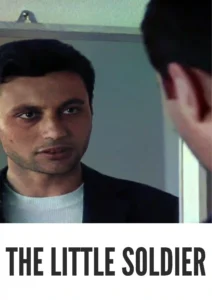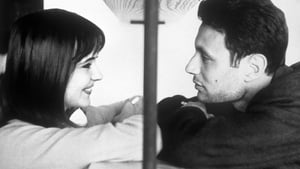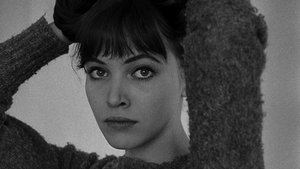Contact: info@alwanfilm.com
Video Sources 0 Views
Synopsis
The Little Soldier 1963 Colorized Review: A Poignant Exploration of Identity and Ideology

Introduction
“The Little Soldier” (1963) emerges as a poignant and introspective exploration of identity and ideology set against the backdrop of the Algerian War of Independence. Directed by Jean-Luc Godard, this groundbreaking French film offers a raw and unflinching portrayal of the moral complexities and existential dilemmas faced by its protagonist, a disillusioned and morally conflicted intelligence officer caught between loyalty to his country and his own conscience. With its innovative narrative structure, evocative cinematography, and powerful performances, “The Little Soldier” continues to resonate with audiences, inviting them to confront the moral ambiguities of war and the elusive nature of personal and political identity.
Check The Full Colorized Movies List
Check Our Colorized Movies Trailer Channel
The Artistry of The Little Soldier 1963 Colorized
Godard’s Directorial Vision
At the helm of “The Little Soldier” is Jean-Luc Godard, one of the most influential filmmakers of the French New Wave movement. Known for his innovative storytelling techniques and subversive approach to cinematic conventions, Godard brings his trademark style and sensibility to this gripping tale of espionage and intrigue. Through his masterful direction, Godard creates a tense and atmospheric thriller that keeps viewers on the edge of their seats while provoking them to question the nature of truth, justice, and moral responsibility.
Compelling Performances
Central to the film’s impact are the compelling performances of its ensemble cast, led by Michel Subor in the role of Bruno Forestier, a troubled and morally conflicted intelligence officer working for the French government. Subor delivers a nuanced and emotionally resonant performance, capturing the inner turmoil and existential angst of his character with remarkable depth and subtlety. Supported by a talented cast that includes Anna Karina, Henri-Jacques Huet, and Paul Beauvais, Subor brings Bruno’s world to life with authenticity and emotional resonance, drawing viewers into his harrowing journey of self-discovery and redemption.
Revisiting the Storytelling Mastery: Plot and Themes
A Tale of Moral Complexity
“The Little Soldier” unfolds as a tale of moral complexity and existential crisis, as Bruno Forestier grapples with the ethical dilemmas and political realities of his profession. Tasked with carrying out covert operations against the Algerian independence movement, Bruno finds himself torn between loyalty to his country and his growing disillusionment with the brutality and injustice of the colonial regime. As he navigates a treacherous world of deception and betrayal, Bruno must confront the moral ambiguities of his actions and the consequences of his choices, ultimately seeking redemption in an act of defiance against the powers that be.
Themes of Identity and Ideology
At the heart of “The Little Soldier” are themes of identity and ideology, as Bruno Forestier wrestles with questions of personal and political allegiance in the midst of a bitter and protracted conflict. Caught between the conflicting demands of his superiors and his own conscience, Bruno embarks on a journey of self-discovery that forces him to confront the contradictions and hypocrisies of the colonial system. Through his interactions with fellow operatives, informants, and adversaries, Bruno grapples with the complexities of identity and ideology in a world torn apart by war and oppression.
The Complex Relationships in Bruno’s Life
Love and Betrayal
Central to Bruno’s journey is his relationship with Veronica Dreyer, a mysterious and enigmatic woman with ties to the Algerian resistance movement. Played with understated elegance by Anna Karina, Veronica serves as both a romantic interest and a catalyst for Bruno’s moral awakening, challenging him to confront his own complicity in the violence and injustice of the colonial regime. As their relationship deepens, Bruno and Veronica must navigate a treacherous landscape of love and betrayal, where trust is a rare commodity and loyalty comes at a steep price.
Friendship and Loyalty
In addition to his relationship with Veronica, Bruno also forms a bond of friendship and camaraderie with Jacques, a fellow intelligence officer and confidant. Played with warmth and sincerity by Henri-Jacques Huet, Jacques serves as a moral compass for Bruno, offering guidance and support in his darkest hours. Together, Bruno and Jacques navigate the complexities of their profession, grappling with questions of duty and honor in a world where the lines between friend and foe are often blurred.
A Visual and Technical Triumph
Evocative Cinematography
Shot on location in France and Switzerland, “The Little Soldier” boasts evocative cinematography that captures the beauty and brutality of its wartime setting with breathtaking authenticity. From the sun-drenched streets of Paris to the snow-covered landscapes of the Swiss Alps, every frame is imbued with a sense of urgency and immediacy that draws viewers into the heart of the action. Through its striking use of light, shadow, and composition, the film creates a rich and immersive visual experience that enhances its emotional impact and thematic resonance.
Early Colored Films Version
In a departure from convention, the filmmakers behind “The Little Soldier” experimented with an early colored films version of the movie, offering audiences a new perspective on its timeless narrative. This innovative approach to colorization adds depth and richness to the film’s visuals, enhancing its already immersive aesthetic and elevating the overall viewing experience.
Behind the Scenes of The Little Soldier 1963 Colorized
Godard’s Creative Process
Behind the camera, Jean-Luc Godard worked tirelessly to bring “The Little Soldier” to life with authenticity and integrity. Drawing on his own experiences as a filmmaker and political activist, Godard infused the film with a sense of urgency and immediacy that reflects the tumultuous social and political climate of the era. From the casting of the actors to the design of the sets and costumes, every aspect of the production was crafted with meticulous care and attention to detail. Godard’s uncompromising commitment to cinematic realism and emotional truth shines through in every frame, as he transports viewers to a world of danger and intrigue with breathtaking authenticity.
Collaborative Collaboration
One of the most remarkable aspects of “The Little Soldier” is the collaborative spirit that infused every aspect of its creation. From the dedicated performances of the cast to the innovative contributions of the production crew, each member of the team played a vital role in bringing Godard’s vision to life. Through their collective efforts, they created a cinematic experience that is as immersive as it is thought-provoking, captivating audiences with its gripping narrative and unforgettable characters.
Legacy and Influence on Cinema
Critical Acclaim and Recognition
Upon its release, “The Little Soldier” received widespread critical acclaim for its bold storytelling, innovative visuals, and powerful performances. The film went on to win numerous awards, including the prestigious Golden Bear at the Berlin International Film Festival, cementing its status as a cinematic masterpiece. Over the years, “The Little Soldier” has continued to inspire filmmakers and audiences alike, earning a place in the pantheon of great works of art.
Enduring Relevance
As we revisit “The Little Soldier” in the present day, its themes of identity, ideology, and moral ambiguity continue to resonate with audiences around the world. In an age marked by political upheaval, social unrest, and moral uncertainty, the film serves as a timely reminder of the dangers of blind allegiance and the importance of questioning authority. Through its timeless narrative and visionary aesthetics, “The Little Soldier” invites viewers to confront the complexities of war and occupation, and to consider the true cost of standing up for what is right.
Where to Watch “The Little Soldier 1963 Colorized Full Movie”?
For those eager to experience the gripping drama and thought-provoking themes of “The Little Soldier” in its entirety, the film is readily available on various streaming platforms and home video releases. Whether you’re a fan of international cinema or simply looking for a compelling and intellectually stimulating cinematic experience, “The Little Soldier” promises to captivate and inspire audiences of all backgrounds—a timeless testament to the enduring power of cinema as an art form.
In Conclusion
“The Little Soldier” (1963) stands as a powerful and provocative exploration of identity, ideology, and moral ambiguity, offering viewers a gripping and emotionally resonant cinematic experience. With its innovative storytelling, evocative visuals, and powerful performances, Jean-Luc Godard’s masterwork continues to captivate and inspire audiences around the world, inviting them to confront the complexities of war and occupation with courage and compassion. As we revisit this timeless classic, let us celebrate its enduring legacy and appreciate its timeless relevance in an ever-changing world.







